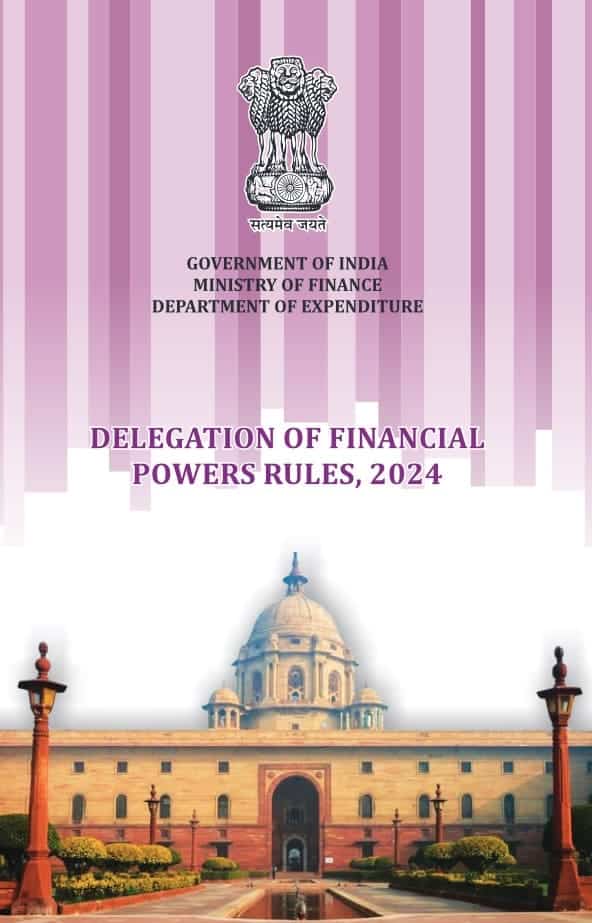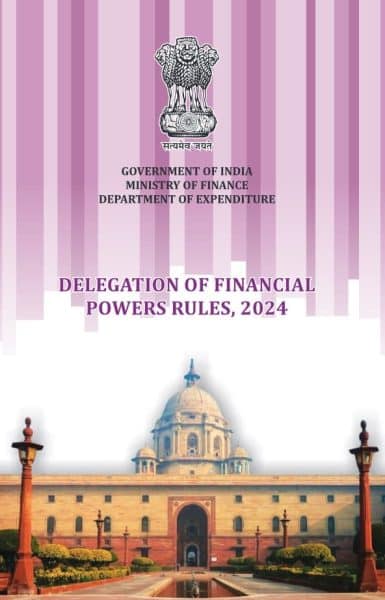Delegation of Financial Powers Rules, 2024 – Book PDF by MoF, Department of Expenditure
GOVERNMENT OF INDIA
MINISTRY OF FINANCE
DEPARTMENT OF EXPENDITURE
DELEGATION OF FINANCIAL
POWERS RULES, 2024
PREFACE
Delegation in general, and delegation of financial powers in particular, is an important determinant of efficiency in large organisations. Recognizing the need for a contemporary framework that fosters quicker and more efficient decision-making without loss of control, the Delegation of Financial Powers Rules 2024 has been formulated as a replacement for its predecessor, the Delegation of Financial Powers Rules 1978.
The exercise of revising the Delegation of Financial Powers Rules began with a critical examination of the 1978 Rules. Some of the provisions were perceived as complex and occasionally ambiguous. A comprehensive revision, therefore, became imperative.
A key objective of the Delegation of Financial Powers Rules 2024 is simplicity and ease of understanding. The aim is to empower users with a framework of rules that is not only comprehensive but also easily navigable, so that financial decision makers at all levels can comprehend and execute their responsibilities with clarity. The rules have also been designed to accommodate updates and modifications in a timely manner, making them adaptive and responsive to future needs.
To facilitate agile financial decision-making, the Delegation of Financial Powers Rules 2024 allow greater autonomy to various levels of authority, and reduce bottlenecks. They aim to empower departments and individuals, fostering a sense of ownership and responsibility for financial decisions.
(Dr. T. V. Somanathan)
Finance Secretary & Secretary (Expenditure)
Government of India
INDEX
RULES
- Short title and commencement
- Power to relax
- Definitions
- Provision of funds by Parliament
- General conditions on powers to sanction expenditure
- Residuary financial powers
- Sanction of expenditure
- Primary unit of appropriation
- Allotment of Funds
- Appropriation and Re-Appropriation
- Indents, contracts and purchases
- Powers of Subordinate Authorities
- Powers of Subordinate Authorities to write off loss
- Insurance of Government property
- Waiver of recovery of overpayment made to Government servants
- Expenditure on Schemes or Projects
- Grant-in-aid, loans, etc
- Trading operations
- Dismantlement of public buildings
- Communication of sanctions to audit
- Repeal and savings
ANNEXURES
- List of Object Heads
- General conditions for incurring Expenditure
APPENDICES
OTHER RELATED ORDERS
Rule 1: Short title and commencement-
(1) These rules may be called the Delegation of Financial Powers Rules, 2024.
(2) They shall come into force with effect from the 1* day of April, 2024.
Rule 2: Power to Relax- The President being satisfied that it is necessary or expedient so to do may, by general or special order, –
(a) relax all or any provisions of these rules in relation to any authority;
(b) delegate to any authority powers in addition to the powers delegated under these rules:
(c) reduce the powers delegated to any authority to such extent as may be specified in the order;
(d) impose conditions in addition to those specified by these rules; and
(e) withdraw from any authority all or any of the powers delegated under these rules.
Rule 3: Definitions-
(1) In these rules, unless the context otherwise requires –
(a) “Administrator” means an Administrator of a Union territory, by
whatever name designated, appointed under Article 239 of the Constitution;
(b) “Annexure” means the Annexure appended to these rules;
(c) “Appropriation” means the assignments of funds to defray charges in respect of services indicated voted or charged section;
(d) “Competent Authority” means, in respect of the power to be exercised under any of these rules, the President or such other authority to which the power is delegated by or under these rules, or any other general or special rules or orders issued by the Government of India;
(e) “Department of the Government of India” means any of the Ministries, Departments, Secretariats and Offices as notified from time to time and listed in the First Schedule to the Government of India (Al-location of Business Rules) and the Vice-President’s Secretariat;
(f) “Finance Ministry” means the Department of Expenditure, Ministry of Finance of the Government of India:
Provided that in any Department of the Government of India where the Scheme of Integrated Financial Adviser is in force, the Integrated Financial Adviser of that Department, will, subject to supervision by Finance Ministry, exercise all or any of the powers delegated by Finance Ministry.
(g) “Head of the Department” means an authority or person (not below the rank of Deputy Secretary to the Government of India and equivalent), declared by the Department concerned, in the Government of India, as a Head of the Department (HoD) in relation to an identifiable establishment or establishments to exercise the financial powers delegated to him under these rules;
(h) “Head of Office” means a Gazetted Officer designated as such, subordinate to Administrators and Heads of Departments;
(i) “Ministry of Finance” means the Departments concerned with the subject matter in the Ministry of Finance;
(j) “Projects” means one-time expenditure resulting in creation of capital assets or otherwise, which could yield financial or economic returns or both and such projects may either be separate or part of an approved Scheme;
(k) “Re-appropriation” means transfer, by a Competent Authority, of funds from one primary unit of appropriation to another to meet additional expenditure within the same Section (Revenue Section and Capital Section) of the grant or Appropriation;
(l) “Recurring expenditure” means expenditure which is incurred at periodical intervals for the same purpose and the expenditure other than recurring expenditure is non-recurring expenditure;
(m) “Schemes” means programmes through which Departments of the Government of India spend resources for delivering goods or, services or both.
(2) The terms and expressions used in these rules and not defined here but defined in the General Financial Rules shall have the meanings respectively assigned to them in the said General Financial Rules.



COMMENTS